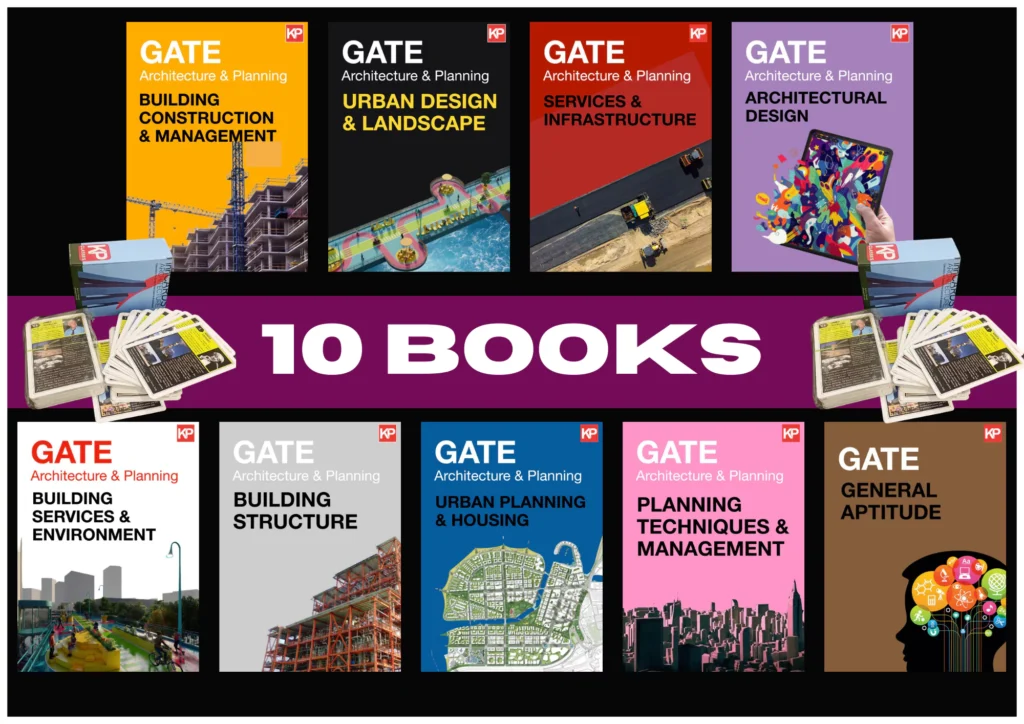GATE 2026 Syllabus for Architecture & Planning PDF | Download
The official website of IISc Bangalore will publish the GATE 2026 Syllabus for Architecture & Planning (AR). As Per Recent exam of GATE 2025 Aspirants should refer syllabus while preparing for the exam. Additionally, the GATE 2026 syllabus for Architecture and Planning in pdf format is accessible on the Internet.

It is imperative for GATE aspirants to commence their exam preparation at the earliest since the syllabus is extensive and covers topics in great depth. The GATE architecture syllabus for 2026 will consist of thirteen sections, and questions in the exam will be sourced exclusively from these sections. Candidates must obtain the Gate Architecture and Planning syllabus online and can refer to this article for comprehensive information on the GATE 2026 syllabus for Architecture and Planning. The date of the GATE 2026 exam will be on first on second week of February. Additionally, candidates can refer to this article for information on GATE exam reference books related to the GATE 2026 syllabus for Architecture and Planning and exam patterns.

GATE Architecture Exam Pattern 2026
The GATE 2026 exam paper includes a General Aptitude (GA) section worth 15 marks, which is applicable to all papers.
The paper is divided into two parts, Part A (60 marks) and Part B (25 marks), covering various topics related to Architecture & Planning (AR).
GATE Exam Pattern
| General Aptitude (GA) Marks of Architecture & Planning (AR) | 15 Marks |
| Subject Marks | 85 Marks |
| Total Marks | 100 Marks |
| Total Time (in Minutes) | 180 Minutes |
Recommended For you Aspirants!
GATE AR 2026
Part A
Part (A) is mandatory for all candidates, while Part B consists of two optional sections, namely Part B1 (Architecture) and Part B2 (Planning).
The topics covered in the exam include Architecture & Planning (AR), Planning and Design, Construction and Management, Environmental Planning and Design, Urban Design, Landscape and Conservation, Planning Process, Housing, Services and Infrastructure, History and Contemporary Architecture & Planning (AR), Building Construction and Structural Systems, Building Services and Sustainability, Regional and Settlement Planning, Planning Techniques and Management, and Infrastructure Planning.
To access the complete GATE Architecture & Planning (AR) Syllabus 2026, please read the full article and click on the PDF link provided.
GATE Important links
| Live Online Classes | Test Series | PYQ Detailed Solution |
| Physical Classes | Mock Test | PYQ (2012-2025) |
| Crash Course | Mini Test | Answer Key (2012-25) |
Part A: Common Section 1: Architecture, Planning and Design Architectural Graphics; Visual composition in 2D and 3D; Computer application in Architecture and Planning; Anthropometrics; Organization of space; Circulation- horizontal and vertical; Space Standards; Universal design; Building byelaws; Codes and standards;
Section 2: Construction and Management Project management techniques e.g. PERT, CPM etc.; Estimation and Specification; Professional practice and ethics; Form and Structure; Principles and design of disaster resistant structures; Temporary structures for rehabilitation;
Section 3: Environmental Planning and Design Natural and man-made ecosystem; Ecological principles; Environmental considerations in Planning and design; Environmental pollution- types, causes, controls and abatement strategies; Sustainable development, goals and strategies; Climate change and built environment; Climate responsive design;
Section 4: Urban Design, Landscape and Conservation Historical and modern examples of urban design; Elements of urban built environment – urbanform, spaces, structure, pattern, fabric, texture, grain etc.; Concepts and theories of urban design; Principles, tools and techniques of urban design; Public spaces, character, spatial qualities and Sense of Place; Urban design interventions for sustainable development and transportation; Development controls – FAR, densities and building byelaws.; Urban renewal and conservation; heritage conservation; historical public spaces and gardens; Landscape design; Site planning;

Section 5: Planning process Salient concepts, theories and principles of urban planning; concepts of cities – Eco-City, SmartCity; Concepts and theories by trendsetting planners and designers; Ekistics; Urban sociology; Social, Economic and environmental cost benefit analysis; Methods of non-spatial and spatial data analysis; Development guidelines such as URDPFI;
Section 6: Housing Housing typologies; Concepts, principles and examples of neighbourhood; Residential densities; Affordable Housing; Real estate valuation;
Section 7: Services and Infrastructure Firefighting Systems; Building Safety and Security systems; Building Management Systems; Water treatment; Water supply and distribution system; Water harvesting systems; Principles, Planning and Design of storm water drainage system; Sewage disposal methods; Methods of solid waste management – collection, transportation and disposal; Recycling and Reuse of solid waste; Landuse – transportation – urban form inter-relationships; Design of roads, intersections, grade separators and parking areas; Hierarchy of roads and level of service; Para-transits and other modes of transportation, Pedestrian and slow moving traffic planning;
Part B1
Architecture Section B1.1: History and Contemporary Architecture Principles of Art and Architecture; World History of Architecture: Egyptian, Greco-Roman classical period, Byzantine, Gothic, Renaissance, Baroque-Rococo, etc.; Recent trendsin Contemporary Architecture: Art nouveau, Art Deco, Eclecticism, International styles, Post Modernism, Deconstruction in architecture, etc.; Influence of Modern art and Design in Architecture; Indian vernacular and traditional Architecture, Oriental Architecture; Works of renowned national and international architects;
Section B1.2: Building Construction and Structural systems Building construction techniques, methods and details; Building systems and prefabrication of building elements; Principles of Modular Coordination; Construction planning and equipment; Building material characteristics and applications; Principles of strength of materials; Alternative building materials; Foundations; Design of structural elements with different materials; Elastic and Limit State design; Structural systems; Principles of Pre-stressing; High Rise and Long Span structures, gravity and lateral load resisting systems;
Section B1.3: Building Services and Sustainability Solar architecture; Thermal, visual and acoustic comfort in built environments; Natural and Mechanical ventilation in buildings; Air-Conditioning systems; Sustainable building strategies; Building Performance Simulation and Evaluation; Intelligent Buildings; Water supply; Sewerage and drainage systems; Sanitary fittings and fixtures; Plumbing systems; Principles of internal and external drainage system; Principles of electrification of buildings; Elevators and Escalators – standards and uses;
Part B2
Planning Section B2.1: Regional and Settlement Planning Regional delineation; settlement hierarchy; Types and hierarchy of plans; Various schemes and programs of central government; Transit Oriented Development (TOD), SEZ, SRZ etc.; Public Perception and user behaviour; National Housing Policies, Programs and Schemes.; Slums, Squatters and informal housing; Standards for housing and community facilities; Housing for special areas and needs;
Section B2.2: Planning Techniques and Management Application of G.I.S and Remote Sensing techniques in urban and regional planning; Tools and techniques of Surveys – Physical, Topographical, Land use and Socio-economic Surveys; Urban Economics, Law of demand and supply of land and its use in planning; Graphic presentation of spatial data; Local self-governance, Panchayatiraj institutions; Planning Legislation and implementation – Land Acquisition Act, PPP etc.; Decision support system and Land Information System; Urban geography and econometrics; Management of Infrastructure Projects; Demography and equity in planning;

GATE Architecture & Planning Study Material
Click Here To Download GATE 2026 AR Syllabus PDF
Section B2.3: Infrastructure Planning Process and Principles of Transportation Planning and Traffic Engineering; Road capacity and Travel demand forecasting; Traffic survey methods, Traffic flow Analysis; Traffic analyses and design considerations; Traffic and transport management and control in urban areas; Mass transportation planning; Intelligent Transportation Systems; Urban and Rural Infrastructure System Network.


